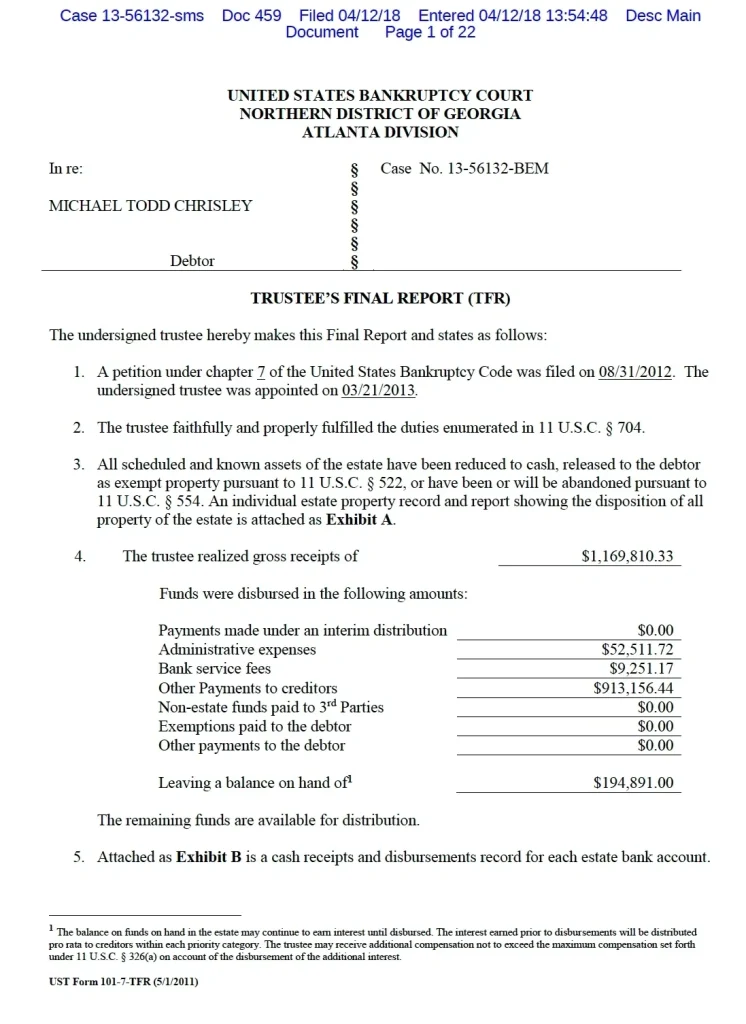Todd and Julie Chrisley: A Deceptive Empire Built on Fraud and Bankruptcy
Todd and Julie Chrisley, once beloved stars of the reality television show “Chrisley Knows Best,” built an empire by showcasing their lavish lifestyle and seemingly idyllic Southern charm. But beneath the facade of family perfection and luxurious living lay a foundation riddled with deception, fraud, and deceit. Court documents, investigations, and legal proceedings now reveal the staggering extent of the Chrisleys’ financial manipulations, highlighting a multi-million dollar scheme designed to defraud banks, creditors, and ultimately, the American public.

A Lavish Lifestyle Funded by Fraud
When Todd Chrisley filed for Chapter 7 bankruptcy in August 2012, it raised eyebrows. Initially filed in the Northern District of Florida, the case was later moved to the Northern District of Georgia due to the complexity and scale of financial irregularities involved. Bankruptcy Trustee Jason L. Pettie was appointed to untangle the web of deceit. As court records would soon uncover, Chrisley’s financial turmoil was no unfortunate accident but a carefully executed series of fraudulent activities.
The bankruptcy court filings detail the uncovering of more than $1 million worth of previously undisclosed luxury assets, including designer clothing, high-value jewelry, and notably, Brookhaven Bank stock valued at approximately $1 million. These assets were meticulously hidden or fraudulently transferred to various family members, including Julie Chrisley, and obscured within complex family trusts. Todd Chrisley’s efforts to shield these assets from creditors represented a flagrant violation of bankruptcy law【11†source】【16†source】.

Financial Manipulations: A Trail of Fraudulent Transfers
Court-appointed Special Counsel Smith, Gambrell & Russell (SGR) played a pivotal role in unraveling the Chrisleys’ intricate scheme. Utilizing subpoenas to tech giants such as AOL and Google, SGR accessed crucial electronic records that revealed Todd and Julie Chrisley’s deliberate attempts to conceal assets. Through email communications, financial transactions, and digital documentation, the special counsel exposed the depth of the couple’s fraudulent behavior.

Several specific examples illustrate the extent of these fraudulent transfers:
- Real Estate Fraud: Julie Chrisley was implicated in a fraudulent transfer involving a possessory interest in a luxury vacation home in Walton County, Florida. Todd Chrisley had attempted to obscure this valuable asset by transferring interest in the property to Julie Chrisley to shield it from creditors.
- Insurance Fraud: The Chrisleys diverted a significant insurance payout—totaling approximately $96,998.36—originally owed to creditors. These funds were instead secretly redirected to accounts controlled by Julie Chrisley, further demonstrating the pair’s deceptive financial maneuvering.
- Luxury Goods Concealment: Court filings detailed the recovery of previously undisclosed luxury items, including designer clothes valued at tens of thousands of dollars. These assets had been systematically concealed through deceptive asset transfers, with Julie Chrisley actively facilitating these hidden transactions.
- Bank Stock Manipulation: Todd Chrisley fraudulently transferred Brookhaven Bank stock, valued at around $1 million, pledging it as collateral against substantial debts while simultaneously hiding its true value from the bankruptcy estate.

Trustee Pettie’s efforts led to successful litigation aimed at reclaiming these fraudulently diverted assets, sending a clear message regarding the consequences of such deceitful actions【11†source】【13†source】【14†source】.
Defrauding Banks and Creditors
Perhaps the most shocking element of the Chrisley saga was their calculated strategy of defrauding banks. Court documents reveal that the Chrisleys systematically secured substantial loans by presenting vastly inflated personal net worth statements. Once these loans were obtained, they strategically filed bankruptcy, evading accountability and leaving financial institutions with significant losses.
These revelations have shown that the Chrisleys deliberately leveraged their public image of affluence to mask a precarious financial state, actively misleading banks and creditors into believing they were financially stable when, in reality, they were deeply indebted and overextended. Bankruptcy proceedings have since led to the recovery of over $1.16 million from these hidden or fraudulently transferred assets【11†source】【16†source】.

Legal and Public Repercussions
The recovery of hidden assets facilitated payments exceeding $913,000 to creditors, but the financial toll of uncovering the Chrisleys’ deceit was substantial, requiring extensive legal resources, forensic accounting services, and administrative costs. Legal experts have uniformly condemned the Chrisleys’ scheme as a clear example of calculated white-collar crime, decrying the audacity and blatant disregard for legal and ethical standards.
The public backlash against the Chrisleys has been intense, fueled by media coverage from TMZ, Radar Online, and active discussions across platforms like Reddit. Commentary frequently expresses outrage and disgust at the stark contrast between the family’s carefully managed public image and their private criminal activities. Public sentiment highlights not only anger but also deep disappointment, as many former fans grapple with reconciling the family’s charismatic public persona with their proven dishonesty.
The Cost of Celebrity Fraud
Ultimately, the fallout from Todd and Julie Chrisley’s fraudulent bankruptcy has been severe and lasting. Their meticulously constructed empire, built on a foundation of lies and deception, has collapsed spectacularly under the scrutiny of legal authorities and public outrage. The Chrisley case underscores the severe consequences and broader implications of white-collar crime, particularly involving public figures who exploit their image for personal gain.
This saga serves as a stark warning about the vulnerabilities within financial and legal systems, highlighting the ease with which charismatic fraudsters can exploit trust and goodwill for malicious purposes. The Chrisley family’s fall from grace is not only a cautionary tale about greed and deception but also a sobering reminder of the need for vigilance and accountability in the realms of finance, celebrity culture, and beyond.

